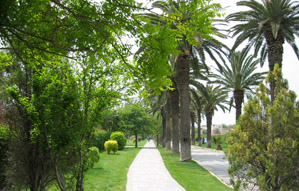"The Farmer Must Not Be Alone" – The Rector of the Agricultural University of Athens at the Conference Organized by Cantina and Proto Thema.

The country’s primary production sector was at the center of the discussion titled “The Vision of a National Agri-Food Strategy,” in which the Rector of the Agricultural University of Athens (AUA), Spyros Kintzios, participated alongside the Minister of Rural Development and Food, Konstantinos Tsiaras, former Finance Minister Philippos Sachinidis, and the president of EOS Capital Partners Fund, Apostolos Tamvakakis. The discussion was moderated by the Director of Proto Thema, Babis Koutras. The event took place as part of the 1st Cantina Academy, under the theme “Securing the Future of Food.”
“We must reconsider centrally and from a fresh perspective how we ‘marry’ domestic production — first and foremost to meet the nutritional needs of our people,” emphasized the Rector of AUA. “At the same time, we must not forget that we are operating within an international trade framework: we cannot produce everything, and we certainly need to maintain strategic food reserves.”
As Rector Spyros Kintzios noted, “The primary sector is the most powerful one. Moreover, in promoting Greek products and channeling them into the other key economic activity — tourism — education and coordination also play a role. We can showcase the truly superior quality of Greek products. We have the tools for this — the so-called ‘E.E.P.I.T.’ (Certified Traditional Craft Products). Bold decisions and strong coordination at the regional level are needed. As a university, we can collaborate with all relevant stakeholders.”
The Role of the University
“As a university, we are at the center of a multifaceted activity,” said the Rector. “The first mission of the university is education. Education is no longer limited to graduating agronomists — it now also includes the farmer. It is crucial that today’s farmer receives up-to-date education — to keep updating their knowledge. Education will provide the foundation for farmers to effectively use modern tools, in combination with policy measures.”
“The second mission is research. At the Agricultural University of Athens, we conduct research with excellent results — as confirmed by all evaluation and ranking indicators — and we are strategic partners of the State. For years now, we have established innovation hubs that bring the university and knowledge to the ‘heart’ of agricultural production. We have done this in Thessaly, Central Greece, Attica, and we are now launching one at the Agricultural School of Messara.”
Productivity and the Need to Support Farmers
The Rector noted that beyond education, there are basic infrastructure issues that go beyond the responsibility of a single farmer or group of farmers, and which fall under the jurisdiction of the State. However, he stressed, science provides tools.
The productivity issue, he explained, is linked to the lack of focus on using modern means of production. “We must introduce all necessary tools — not theoretically, but practically, today — to reduce costs and increase yield.”
He added that Greek soils have degraded: “Firstly, because the financial crisis left no money for fertilization — so soils were under-fertilized. Secondly, we have a problem with the quality of the soil itself. Let’s not forget that 70% of Greece is mountainous or semi-mountainous.”
“It is vital to understand that we need to retain population in rural areas,” said the Rector, adding that knowledge is not lacking — it is produced at universities — and despite degradation, the soil is not the decisive factor.
“What is truly lacking is human capital. We don’t have people in agriculture. How can we bring people back to farming? If a young farmer knows that they can make a living from this profession, they will do it. How can we convince them? We must reduce their costs, using smart methods: show them how to do it, examine the issue of cooperatives and work on that — but above all, we must stand by the farmer. The farmer must not be alone. If they realize this and trust that there is a system — all institutions — that will show them how to reduce costs using modern production tools, how to cultivate, how to market their product, and how to connect with value chains, then we will succeed.”


